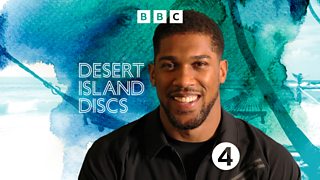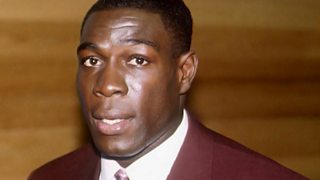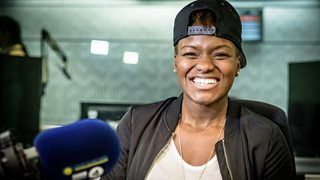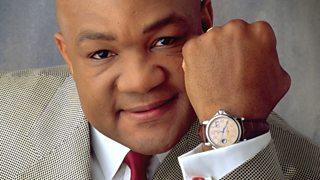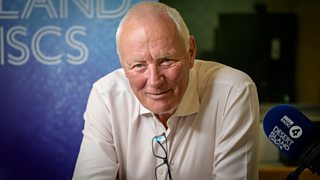10 things we learned from Anthony Joshua’s Desert Island Discs
Anthony Joshua is one of the UK’s most successful boxers ever. He was the first fighter to win both an Olympic gold medal and a world title. He’s twice been the World Heavyweight unified champion and he’s reported to be one of the sport’s wealthiest competitors, with the Sunday Times Rich List estimating his wealth at £175 million. And he’s still just 34.
Life wasn’t always easy for Anthony. Born in London, he says he was often getting in trouble as a teenager, but when he found boxing it gave him a new focus.
Here are 10 things we learned from his Desert Island Discs…
-
![]()
Listen to Anthony Joshua's Desert Island Discs
Listen on Â鶹ԼÅÄ Sounds to hear the episode with full music tracks first.
1. Bad weather pushed him towards boxing
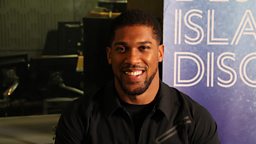
Anthony was always sporty. At school, he was very good at football and sprinting. “But the thing I used to hate about football,” he says, “was when it used to rain, when it was snowing, when it was freezing outside.” Boxing solved two problems for him.
I was like, ‘Come and punch me in my stomach.’ I was 13. He said, ‘Bro, from that day you were just turning into a beast!'Anthony's family realised he had a future in boxing from an early age.
He readily admits that he sometimes got into trouble for fighting as a teenager, but when he discovered boxing, at 19, he found something that gave him a healthier outlet. “I was [fighting] in a controlled environment. And secondly, I was indoors so I could box all year round without worrying about freezing. It worked for me!”
2. He only recently moved out of his mum’s flat
Anthony calls his mother, Yeta, “an amazing woman. The cycle of life means that one day my mum won’t be here anymore, and it hurts to think that. She’s done so well to raise someone like me: a hard-headed, hard-working son. I know how tough it must have been for her. She was a single mum at a certain stage in her life. Now that I’m a dad, I really applaud the effort she put into raising me and my sister.”
Anthony and his mum are so close that until recently he still lived with her. “I didn’t want to leave my mum alone,” he says. “I wanted to make sure that her foundations were strong – the nest was strong – so that when I leave, mum’s good. For me, that’s freedom. Knowing no matter where I am in the world, mum’s happy and taken care of.”
3. His cousin knew he’d be a boxer before he did
Anthony was born in Watford, but at the age of 12 his mum took him to Nigeria, where she was born, and he was enrolled in a boarding school there. “It was very strict,” he says. “If you’re in a Nigerian household, the saying is, ‘You’re either going to be a lawyer or a doctor.’ There’s no sport… Education was important. It was tough having to fix up – wash your own clothes, iron your own clothes.”
When he came back, his cousin saw the beginnings of the boxer in him. “He said I was like, ‘Come and punch me in my stomach.’ I was 13. He said, ‘Bro, from that day you were just turning into a beast!’”
4. Lennox Lewis gave him some very valuable advice
After winning a gold medal in the London Olympics in 2012 as an amateur, Anthony soon turned professional. Asked how his life changed, he says “I was famous but still broke… I thought, I’ve got to be smart here. Now it’s about business.”
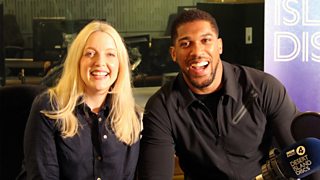
That 90,000 people screaming, that’s so much energy directed at me, directed at the ring. That’s impossible to shut out. The best thing I can do is embrace it.
He took some advice from boxer Lennox Lewis, who had plenty of experience in the industry. “He said, ‘Don’t rush. Start off small. Don’t put pressure on yourself.’ I want all that pressure! The iron’s hot right now! That was my mindset. But I understood what he was saying: Take your time. You’re going to get to where you’re going, but you’re inexperienced, so take your time.” He says the hardest part of growing his career was understanding boxing as a business and learning to manage his finances. “The biggest struggle was learning the business, not fighting. Securing my future was the biggest struggle.”
5. He now feeds off the sound of the crowd
During the Olympics, Anthony says he “tried to shut the noise [of the spectators] down. I was new. I was focused. Don’t get caught up in the crowd.” He later learned, when fighting Wladimir Klitschko, that he’d been taking the wrong approach. “That 90,000 people screaming, that’s so much energy directed at me, directed at the ring. That’s impossible to shut out. The best thing I can do is embrace it. Just welcome it and ride the wave, smile, put your fist up at people. Own the moment.”
He now loves the showmanship of fighting. He once even invited Stormzy to perform Shut Up – one of his Desert Island Discs music choices – as he walked out. “It was electric,” he says.
6. Music has always been a huge part of his life
Anthony picks an eclectic range of discs – he’s the first person ever to choose a song by British rapper Skrapz – and says music has always been important to him. He even trained as a sound engineer. “When I was in trouble [as a teenager], I wanted to show that I was not a waste of time to society,” he says. “So… I enrolled in college… and started doing sound engineering.”
He says: “I love music because I feel like it can always set the tone for me and what I’m trying to achieve. I like reggae, classical, hip hop. At the moment, I’m in my classical phase because I need to settle my mind and focus.” Of all his music choices for Desert Island Discs, the most special are “Adele’s Â鶹ԼÅÄtown Glory and Agape by Nicholas Britell. They’re the soundtrack to my life right now.”
7. Five days in a dark room taught him what’s important
Unsurprisingly, Anthony doesn’t like losing. “I’ve actually broken down when I’ve lost before,” he says. “It’s tough… There are options [when you lose]: keep it the same, completely change, or add to what you have. I add to what I have.” As part of his process for building and understanding himself better, Anthony has employed some unusual methods, including spending five days in a pitch-black room.
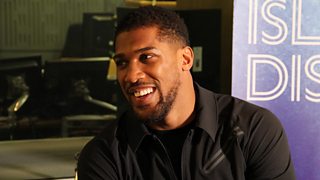
That will be part of my legacy, that I gave something back to the sport that made me.Anthony would like to open a care home for retired boxers with ill health.
“It’s that dark that you can’t see anything. Going into that dark room gave me a bit of time where I could switch off… It was good!” It made him consider what matters to him. “I don’t have enough meaningful conversations with my family… When I was in that dark room, there was that feeling where... I just need to have more meaningful conversation, spend a bit more time with my mum, my dad, my aunt and uncles and sister… It brought home what’s important.”
8. He wants to help older retired boxers
“None of us fighters talk about our health,” he says. “We can notice in fighters when their health is deteriorating, but we never talk about it… All we focus on is winning.” He’s aware that while some boxers reach the end of their careers both healthy and very wealthy, others face many problems, so he’d like to open “a care home for retired boxers if they have bad health… That will be part of my legacy, that I gave something back to the sport that made me.”
9. At home, he’s just ‘dad’
Family is the most important thing to Anthony. He even chooses the theme to The Godfather as a representation of his commitment to family. He has a young son and says when he’s at home he’s no longer the world champion the public sees.
“I’ve always kept boxing out,” he says. “I’m [his] dad. I’m not the boxer. With mum, I’m your son, not the boxer. With my sister, I’m your brother, not the boxer. I’ve always kept it separate. He gets that I fight, but I’m just dad.”
10. He’s not intimidated by life alone on a desert island
“When you’re preparing for a fight, a big part of it is isolation,” he says. “You go to training camp, which means you isolate yourself from family and friends… You’re getting ready for battle and being victorious. Being on a desert island, there is an element of preparing for battle. There’s the element of survival, but the second thing is being alone… I think I’d be pretty comfortable.”
He's also had some experience of fending for himself, having appeared on a TV show with survival expert Bear Grylls. “I thought the show might be fake, that we’d climb a mountain, then go get a McDonalds and stay in a hotel. But I stayed out in the wilderness, I ate a maggot, I jumped in the sea, and I questioned my life at some stage!” He, of course, chooses a Bear Grylls book to take with him.
